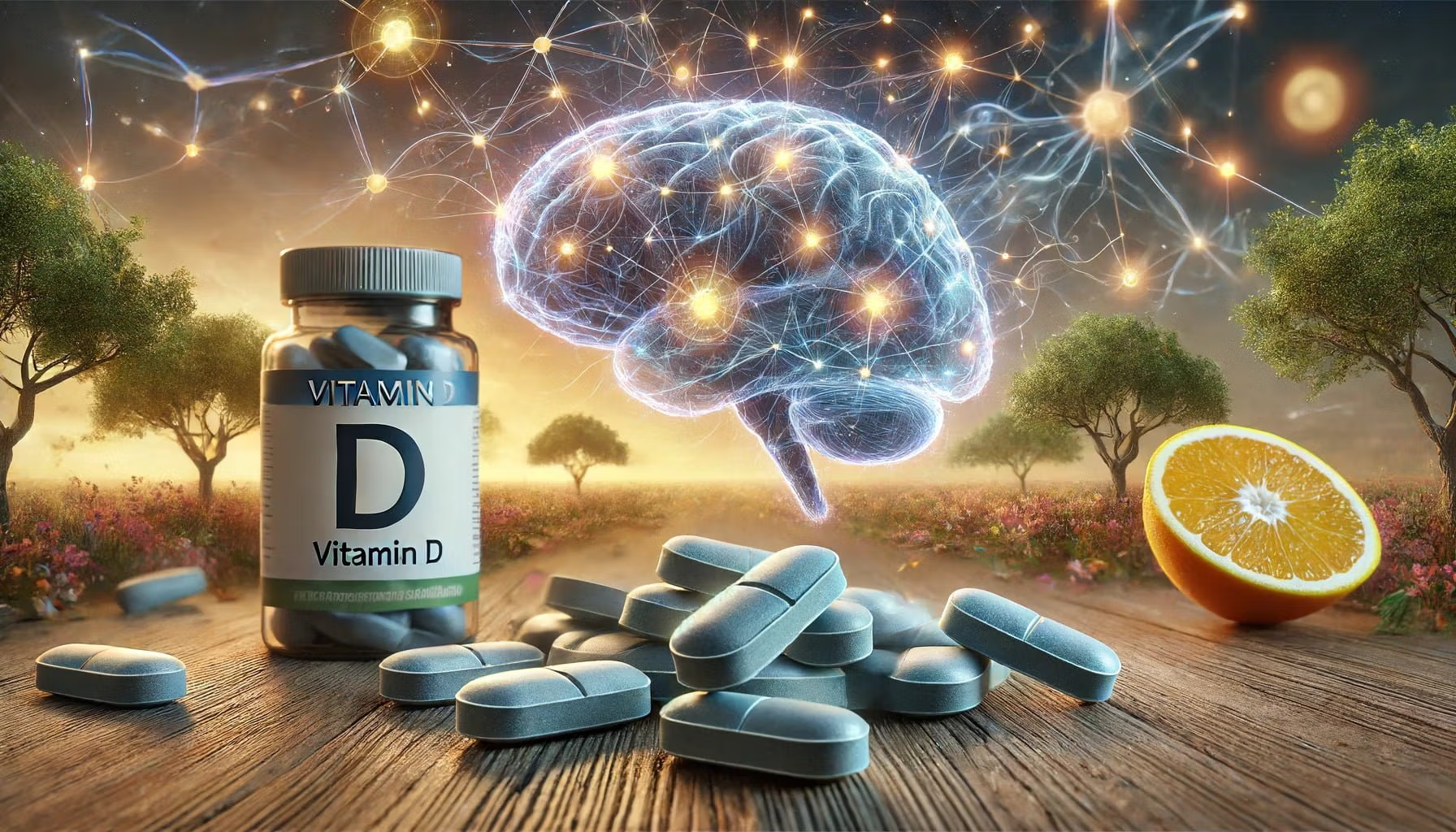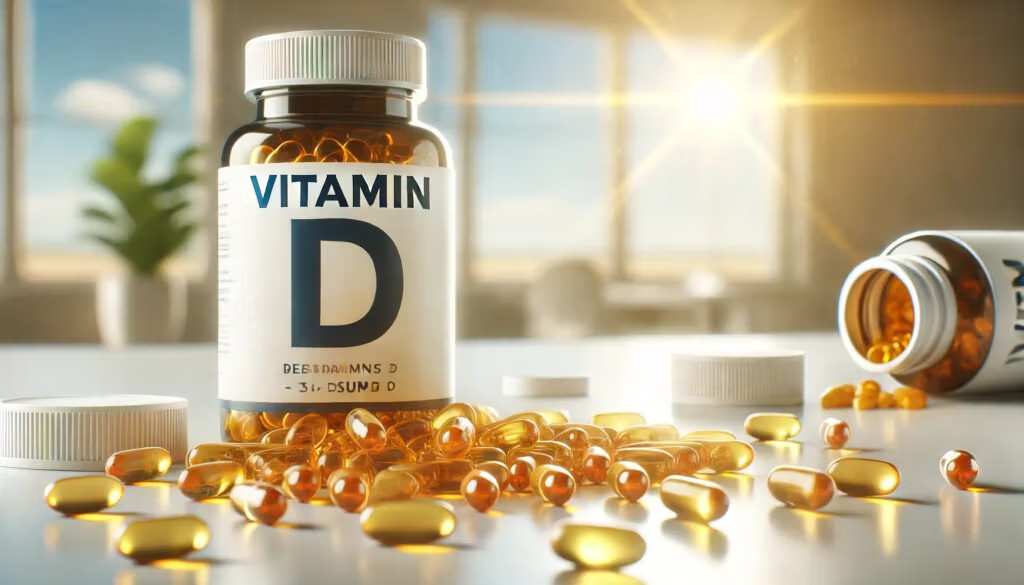
Vitamin D is not just an essential vitamin for bone health and immune function.
Research suggests that Vitamin D also affects cognitive function, memory, and overall brain health.
In this article, we will share how to use vitamin D as a nootropic, so stay tuned.
Table of Contents
What is Vitamin D?
Vitamin D (also known as ”the sunshine vitamin”) is a group of fat-soluble secosteroids responsible for increasing intestinal absorption of calcium, magnesium, and phosphate, and many other biological effects.

What Are The Different Forms of Vitamin D?
The two main forms of vitamin D are:
- Vitamin D3 (cholecalciferol): This form is synthesized in the skin when exposed to UVB radiation from sunlight. It’s also found in animal-based food sources, such as fatty fish, egg yolks, and liver.
- Vitamin D2 (ergocalciferol): This form is derived from plant sources, such as mushrooms, and is often used in fortified foods and supplements.
Both forms are converted to the active form, calcitriol (1,25-dihydroxyvitamin D), in the body.
What Are The Functions of Vitamin D in The Brain and Body?
Vitamin D receptors are found throughout the body, including the brain, indicating its diverse functions:
- Calcium and phosphorus metabolism: Vitamin D regulates the absorption and metabolism of these minerals, which are essential for bone health.
- Neurotransmitter synthesis: It’s involved in the production of neurotransmitters like serotonin and dopamine, which play a role in mood, memory, and attention.
- Neuroprotection: Vitamin D has antioxidant and anti-inflammatory properties that protect brain cells from damage.
- Gene regulation: It regulates the expression of numerous genes involved in brain development and function.
- Genomic actions: Vitamin D binds to the vitamin D receptor (VDR), which then interacts with specific DNA sequences to regulate gene expression.
- Non-genomic actions: Vitamin D can also initiate rapid, non-genomic responses by binding to membrane receptors and activating signaling cascades.
- Immune function: Vitamin D modulates the immune system, helping to prevent autoimmune disorders and infections.
What Are The Dietary Sources of Vitamin D?
The primary sources of vitamin D include:
- Sunlight exposure: UVB radiation from sunlight triggers vitamin D synthesis in the skin.
- Animal-based foods: Fatty fish (salmon, mackerel, sardines), egg yolks, and liver contain vitamin D3.
- Fortified foods: Some dairy products, cereals, and plant-based milk are fortified with vitamin D2 or D3.
- Supplements: Vitamin D supplements are available in both D2 and D3 forms.
How is Vitamin D Metabolized in The Body?
Vitamin D undergoes a series of metabolic steps to become biologically active:
- Synthesis or ingestion: Vitamin D3 is synthesized in the skin upon UVB exposure, while both D2 and D3 can be obtained from dietary sources or supplements.
- Hydroxylation in the liver: Vitamin D is converted to 25-hydroxyvitamin D (25(OH)D) by the enzyme 25-hydroxylase in the liver.
- Hydroxylation in the kidneys: 25(OH)D is further hydroxylated by the enzyme 1α-hydroxylase in the kidneys to form the active metabolite, calcitriol (1,25-dihydroxyvitamin D).
- Binding to receptors: Calcitriol binds to the vitamin D receptor (VDR) in target tissues, regulating gene expression and cellular functions.
How Bioavailable is Vitamin D?
Vitamin D supplements have a bioavailability of 50-90%, with oil-based formulations having higher absorption rates than powder-based ones.
The bioavailability of vitamin D from food sources ranges from 50-80%, depending on the food matrix and the presence of fat.
However, age, obesity, liver and kidney function, and certain medications can influence vitamin D bioavailability.
What Are The Cognitive Benefits of Vitamin D?
Vitamin D has been associated with several cognitive benefits:
| Cognitive Benefit | Mechanism of Action |
|---|---|
| Memory enhancement | Modulates neurotransmitters involved in memory formation and retrieval |
| Attention and focus | Influences dopamine signaling and prefrontal cortex function |
| Mood regulation | Regulates serotonin synthesis and signaling |
| Neuroprotection | Reduces oxidative stress and inflammation in brain cells |

How Does Vitamin D Enhance Memory and Learning?
Vitamin D plays a vital role in memory enhancement.
Researchers found that vitamin D supplementation improved visual and working memory in healthy adults aged 18-25 years old.(1)
Another study demonstrated that higher serum vitamin D levels were significantly associated with better immediate and delayed recall performance on verbal memory tests in older adults with Alzheimer’s (AD).(2)
The exact mechanisms are still being unraveled, but scientists believe vitamin D’s memory-boosting effects come from its ability to increase neural plasticity, protect neurons, and modulate neurotransmitters involved in memory processes.
How Does Vitamin D Increase Attention and Focus?
Maintaining attention and focus is crucial for productivity and learning. Fascinatingly, vitamin D seems to help here too!
A 2018 placebo-controlled study by Kotsi et al. found that vitamin D supplementation significantly improved attention and decision-making in elderly individuals over 12 months.(3)
Vitamin D’s pro-attentional effects may stem from its ability to enhance dopaminergic signaling.(4)
Dopamine is a neurotransmitter that regulates attention, focus, and motivation. By optimizing dopamine function, vitamin D likely sharpens attentional control and reduces distractibility.
How Does Vitamin D Enhance Mood and Motivation?
If you’ve ever felt your mood and motivation dip during the dark winter months, vitamin D could be a factor.
Seasonal affective disorder (SAD), a type of depression that comes and goes with the seasons, has been linked to falling vitamin D levels.(5)
Fortunately, correcting vitamin D deficiency can meaningfully improve mood and sense of well-being.(6)
One meta-analysis by the Journal of Postgraduate Medicine (JPGM) concluded that vitamin D supplementation had a moderate, statistically significant effect in reducing depressive symptoms compared to placebo.(7)
While more research is needed, current evidence suggests maintaining optimal vitamin D levels can help stabilize mood and keep motivation high throughout the year.
How Does Vitamin D Prevent Age-Related Cognitive Decline
Perhaps most excitingly, vitamin D shows promise in protecting the aging brain.
With Alzheimer’s and other dementias affecting 5.8 million Americans (Alzheimer’s Association, 2020), vitamin D optimization may be an accessible way to reduce risk and safeguard cognitive function with age.
Vitamin D appears to defend against cognitive decline by:
- Reducing oxidative stress and inflammation in the brain
- Clearing abnormal proteins like beta-amyloid
- Supporting energy production in neurons
- Activating genes that promote neuronal survival
A study from the American Academy of Neurology found that vitamin D deficiency was associated with a substantially increased risk of all-cause dementia (HR 2.25) and Alzheimer’s disease (HR 2.22) in elderly adults.(8)
What Are The Side Effects and Risks Associated with Vitamin D Supplementation?
Typically, vitamin D is safe when consumed in recommended doses.

However, excessive intake can lead to side effects:
- Hypercalcemia: Excessive vitamin D can cause elevated blood calcium levels, leading to symptoms like fatigue, confusion, and kidney problems.
- Kidney stones: High vitamin D intake may increase the risk of developing kidney stones due to increased calcium absorption.
- Gastrointestinal issues: Some people may experience digestive discomfort, such as nausea or constipation, when taking high doses of vitamin D supplements.
Who Should Avoid Using Vitamin D as A Nootropic?
Certain individuals should exercise caution or avoid using vitamin D as a nootropic:
- Those with hypercalcemia or a history of kidney stones.
- Individuals with granulomatous diseases, such as sarcoidosis or tuberculosis, as they may be more sensitive to vitamin D.
- People who take medications that interact with vitamin D, such as steroids or cholesterol-lowering drugs.
- Pregnant or breastfeeding women should consult their healthcare provider before taking vitamin D supplements.
Are There Any Known Medical Interactions With Vitamin D?
Vitamin D can interact with several medications, including:
- Steroids: Vitamin D may enhance the effects of corticosteroids, increasing the risk of side effects.
- Cholesterol-lowering drugs: Some cholesterol-lowering medications, such as statins, may reduce vitamin D levels in the body.
- Anticonvulsants: Certain anticonvulsant drugs, like phenytoin and phenobarbital, can accelerate the breakdown of vitamin D, leading to deficiency.
- Thiazide diuretics: These medications can increase the risk of hypercalcemia when combined with high doses of vitamin D.
How To Use Vitamin D as A Nootropic?
To use vitamin D as a nootropic, consider the following:
- Get your vitamin D levels tested to determine if you have a deficiency or insufficiency.
- If your levels are low, start with a daily dose of 1,000-2,000 IU of vitamin D3, and gradually increase if needed.
- Take vitamin D with a meal containing fat to enhance absorption.
- Monitor your vitamin D levels periodically and adjust your dosage accordingly.
- Consider combining vitamin D with other nootropics, such as omega-3 fatty acids or magnesium, for synergistic effects.
What is The Recommended Dosage of Vitamin D?
The recommended daily allowance (RDA) for vitamin D varies by age group:
| Age | Dosage |
|---|---|
| Infants (0-12 months) | 400 IU |
| Children and adults (1-70 years) | 600 IU |
| Adults over 70 years | 800 IU |
Note: Some experts suggest that higher Vitamin D3 doses (1,000-4,000 IU) may be necessary to achieve optimal blood levels, particularly for those with limited sun exposure or darker skin.
How to Use Vitamin D in A Nootropic Stack?
Vitamin D can be combined with other nootropics for enhanced cognitive benefits:
- Omega-3 fatty acids: Vitamin D and omega-3s work synergistically to support brain health, reduce inflammation, and improve mood.
- Magnesium: Magnesium is essential for the activation of vitamin D and can help reduce anxiety and improve sleep quality.
- B vitamins: B vitamins, particularly B12 and folate, work with vitamin D to support neurotransmitter synthesis and cognitive function.
- Acetyl-L-carnitine: This amino acid derivative enhances energy production in the brain and may have synergistic effects with vitamin D on neuroprotection.
Example of a natural nootropic stack:
| Nootropic | Dosage |
|---|---|
| Vitamin D3 | 2,000 IU |
| Omega-3 (EPA+DHA) | 1,000 mg |
| Magnesium | 200 mg |
| B-complex | 1 capsule |
| Acetyl-L-carnitine | 500 mg |
- Bailey, Katherine R F, and Jacqueline A Pettersen. “Vitamin D is associated with visual memory in young northern adolescents.” Nutritional neuroscience vol. 27,4 (2024): 392-403. doi:10.1080/1028415X.2023.2199498↩
- Oudshoorn, C et al. “Higher serum vitamin D3 levels are associated with better cognitive test performance in patients with Alzheimer’s disease.” Dementia and geriatric cognitive disorders vol. 25,6 (2008): 539-43. doi:10.1159/000134382↩
- Yang, Tong et al. “Vitamin D Supplementation Improves Cognitive Function Through Reducing Oxidative Stress Regulated by Telomere Length in Older Adults with Mild Cognitive Impairment: A 12-Month Randomized Controlled Trial.” Journal of Alzheimer’s disease : JAD vol. 78,4 (2020): 1509-1518. doi:10.3233/JAD-200926↩
- Trinko, Joseph R et al. “Vitamin D3: A Role in Dopamine Circuit Regulation, Diet-Induced Obesity, and Drug Consumption.” eNeuro vol. 3,2 ENEURO.0122-15.2016. 19 May. 2016, doi:10.1523/ENEURO.0122-15.2016↩
- Melrose, Sherri. “Seasonal Affective Disorder: An Overview of Assessment and Treatment Approaches.” Depression research and treatment vol. 2015 (2015): 178564. doi:10.1155/2015/178564↩
- Xie, Fei et al. “Effect of vitamin D supplementation on the incidence and prognosis of depression: An updated meta-analysis based on randomized controlled trials.” Frontiers in public health vol. 10 903547. 1 Aug. 2022, doi:10.3389/fpubh.2022.903547↩
- Vellekkatt, F, and V Menon. “Efficacy of vitamin D supplementation in major depression: A meta-analysis of randomized controlled trials.” Journal of postgraduate medicine vol. 65,2 (2019): 74-80. doi:10.4103/jpgm.JPGM_571_17↩
- Littlejohns, Thomas J et al. “Vitamin D and the risk of dementia and Alzheimer disease.” Neurology vol. 83,10 (2014): 920-8. doi:10.1212/WNL.0000000000000755↩

